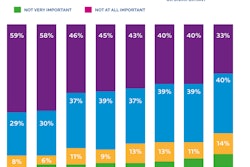
Organizations in every sector increasingly rely on third-party suppliers to fulfill critical business functions throughout the supply chain. Contracts serve as the foundation, defining the terms and conditions of these relationships.
Because of this fact, companies invest significant time, energy and resources to negotiate and properly define responsibilities, compensation and risk. However, are you proactively managing third-party risk and monitoring contract compliance to confirm that your terms and conditions are being met, and relationships are operating as intended?
The greatest contract risks are frequently those that go undetected over long periods of time. Unintentional non-compliance associated with multi-year contracts is all too easy for organizations to overlook for various reasons, but can quickly erode an organization’s earnings per share.
It is important to perform routine contract compliance audits. Contract compliance is an integral part of effective corporate governance, and is much more than just ensuring contract terms and conditions are being met.
An audit can uncover significant overpayments or under-reported revenue, unrecorded liabilities, missed savings and other exposures that could be detrimental to the organization if left unaddressed. Contract compliance audits also provide a unique opportunity to enhance transparency, align expectations and reduce assumptions.
Financial recoveries, root cause analyses and control assessments can quickly equate to substantial margin enhancements, process improvements and risk reduction―ultimately increasing shareholder value.
Even though contract compliance promotes good governance and produces substantial savings, supply chain and procurement teams face a difficult balancing act.
Despite best efforts and good intentions, there aren’t always enough hours in the day or resources at hand to monitor compliance, while managing contracts and tracking spend throughout the supply chain.
With numerous contracts to review and limited bandwidth, where should you start to maximize return on investment (ROI) and exercise effective governance? The good news is there are certain indicators that often signal the need for a contract audit.
Being aware of these risk indicators is paramount when deciding which contracts to audit and determining the timing of an audit. There are a number of intentional and unintentional scenarios that routinely occur within your organization, and signal a need to audit your contracts.
Following is a top 10 list of these indicators.
1. You’re Making a Major Spend or Investment
Whether you are a manufacturer building a new production facility or a technology company launching a global advertising campaign, these investments are critical to the organization’s strategic objectives. Prudent management of contract compliance at the inception of these investments will help ensure their ultimate success.
2. Your Contract Terms Are Complex
It is easy to understand the more complicated a contract, the more difficult it is to comply with the various terms. Dynamic pricing and complicated calculations require careful scrutiny and regular oversight to avoid margin erosion. It is important to adhere to carefully negotiated terms throughout the life of a contract.
3. Your Organizational Structure Is Decentralized
When the ownership of contracts resides in various business groups, it is very easy for each of those groups to assume that compliance is managed by another part of the organization. Audits provide a unique opportunity to ensure compliance protocols are consistent across the organization, no matter how centralized or decentralized operations may be.
4. You’re Thinking about Changing Suppliers
Whether the motivation is cost savings or improved performance, changing suppliers is a unique time to consider a contract compliance audit. The feedback an audit provides on past performance is enormously valuable, and offers an opportunity to clarify or improve contract terms and conditions.
5. You’re Experiencing Personnel Changes
It’s common to lose institutional knowledge when employees involved in contract management leave the company or change roles. A contract compliance audit ensures current practices align with contract provisions, and helps new contract managers understand the nuances of an agreement they may not have personally negotiated or executed.
6. You Were Involved in a Merger or Acquisition
If your company was recently involved in a merger or acquisition, chances are the new organization inherited conflicting contracts with third parties. Managing those transitions is difficult for third parties that previously worked with each company before the business combination. An audit can validate if the third party is accurately applying the most favorable pricing terms and can also identify any transactions occurring outside of the existing agreements.
7. Your Supplier Has Operational Challenges
Operational excellence and contract compliance go hand in hand. If your supplier is not meeting operational objectives such as key performance indicators (KPIs) and service-level agreements (SLAs), there is a high likelihood that they are not adhering to contract terms and conditions. Performing an audit may help identify the root causes of operational challenges. Audits can also contribute to improved operations, in addition to the value of any non-compliance identified.
8. Your Supplier Is Owned or Managed by Former Employees
Did a senior leader with long tenure leave your company to become a supplier? Many experience this phenomenon in services, such as marketing, consulting and contingent labor. Former employees have a high degree of institutional knowledge and can be perceived as an extension of the staff. Invoices from former colleagues, now suppliers, may not be scrutinized as closely as others. When issues do arise, they may be difficult to resolve based on the existing relationship. An audit can provide objective intelligence on the competitiveness of pricing, as well as validate a transaction.
9. You Have Large Transactions with a Small Company
Small private companies usually do not have the same business practice standards as larger public companies. They often unintentionally lack the proper internal controls and best practices to prevent or detect non-compliance. These risks become particularly evident when small companies experience revenue growth that outpaces the development of systems and controls appropriate for the organization’s size. Audits can reduce the risk associated with engaging small suppliers and also help those suppliers see the value of investments in control development.
10. You Are the Supplier’s Biggest Client
If your organization is a supplier’s biggest client, the resulting service and leverage can be enticing. However, this relationship also brings certain risks due to the potential pressures that the supplier will inevitably encounter. For example, this type of supplier may honor the request of a plant manager to pre-bill an order to help preserve the budget before the end of the year. Performing audits of these suppliers can ensure compliant behavior, while also providing a healthy outlet for the suppliers to communicate challenging requests that may be occurring.
For companies to remain viable and competitive, they must rely on third parties. While these third parties are often viewed as an extension of the company’s internal team, it is sometimes all too easy for them to fall into contract non-compliance.
When this happens, it can diminish ROI, erode margins and drive down overall earnings per share. Engaging in periodic contract compliance audits can mitigate third-party risks, validate negotiated savings and ensure the relationship between parties is operating as intended.
Use this list to ask yourself, “Am I at risk?” If the answer is yes, then it’s time to audit your contracts.

















